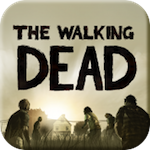 Walking Dead: The Game (Free) is a five-part adventure game series set in the merciless, dark, and violent universe of the Walking Dead. As a whole, the games feel like a celebration of their source material; the characters are believably fickle, the action is terrifying and sudden, and the potential of violence colors every scenario. If you’ve ever wanted to experience Robert Kirkman’s world in game form, this is the way to do it.
Walking Dead: The Game (Free) is a five-part adventure game series set in the merciless, dark, and violent universe of the Walking Dead. As a whole, the games feel like a celebration of their source material; the characters are believably fickle, the action is terrifying and sudden, and the potential of violence colors every scenario. If you’ve ever wanted to experience Robert Kirkman’s world in game form, this is the way to do it.
Boil the entire experience down: Walking Dead is a series of games about broken people in a broken world where decisions are made in bursts of anger, fear, doubt, frustration, disgust and greed. You’ll make hard, horrible choices in great distress. You’ll watch a lot of people die. And you’ll do things you regret.
Choices have meaning. Characters you interact with remember what you’ve said and respond accordingly down the line. There are also significant plot points that you may never see depending on who remains with you.
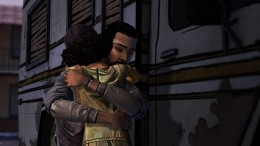 The most engaging moments in the series revolve around choice. You consider if a person is worthwhile to your group or if he or she needs to know something. The repercussions, in some instances, of your choices appear instantly. Others don’t, making you wonder if you’ll ever have to deal with any consequences.
The most engaging moments in the series revolve around choice. You consider if a person is worthwhile to your group or if he or she needs to know something. The repercussions, in some instances, of your choices appear instantly. Others don’t, making you wonder if you’ll ever have to deal with any consequences.
Smart production and writing amp up the drama and tension of these moments, while the promise of the series itself makes you feel like everything you do carries weight. The core story never changes, but the illusion that you’re shaping it is effective.
In the series, you’ll play as a convict named Lee. In the opening of the first episode, Lee finds himself hurt and surrounded by zombies. Unsure of what’s going on, Lee takes off in search of someone, anything. Soon, he meets a young girl that he decides to put under his wing.
Early on, Lee feels more like a vehicle than a defined character. Your decisions as Lee, whether you choose to reveal his past, buddy up with certain characters, or take control of situations, lets you express yourself in this world. In later episodes, Lee starts to become an actual character defined by his distaste for his past and his no-nonsense need to keep Clementine alive.
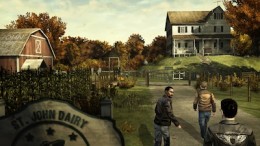 Make no bones about it: as the series progresses, Clementine becomes the star. She’s an honest, caring spirit in a world that doesn’t reward people for doing the “right" thing. The writing for her is amazing. She feels like a person, and as you play, you’ll develop as much of a desire to save her as Lee has.
Make no bones about it: as the series progresses, Clementine becomes the star. She’s an honest, caring spirit in a world that doesn’t reward people for doing the “right" thing. The writing for her is amazing. She feels like a person, and as you play, you’ll develop as much of a desire to save her as Lee has.
This is an adventure game series first and foremost. When there is “action," it occurs in QTE segments that have you tapping or swiping contextually as a zombie runs towards you. These are gruesome scenes, but they’re more than just cheap thrills — characters will notice what you do and maybe even change their attitude towards you as a result of what you’ve done. This is pretty cool.
There are “puzzles," but most of the time, instead of having to put together whacky item combinations, the game asks you questions. Do you want to guard what you did? If so, how will you respond to someone who might know without you telling them? Will you let them die? Will you lie?
The much more traditional puzzle scenarios have you searching for an object and setting up a dramatic chain of events in order to find what you’re looking for. In the first episode, there’s an entire chain of zombie killings you’ll have to take part in by interacting with the environment and setting up each kill. In the third episode, you’ll be tasked with figuring out how to start a train and assembling the tools necessary to do so.
It’s important to note that these touch versions feel great. Slide your fingers to move Lee, tap to pick a dialogue option, and swipe when asked during action. Technically, the series to this point runs fine on new iPad — we’ve seen few audio bugs or the usual Telltale game issues like stuttering, tearing, or plain not working as intended. Also, these ports don’t do anything new; these are the same games you may or may not have played on other platforms.
Below, we’ve got an individual write-up of each episode, in case you want to dig in a little bit more. There are a couple of over-arching plot spoilers, so beware.
Episode 1 – A New Day
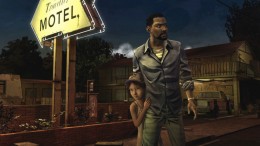 Episode 1 does a couple of things well. The first is build an incredible world. No horror in The Walking Dead is out of bounds. In sudden, terrible bursts of crimson and fury, people die or turn. Some might even give up. This is stuff that makes for interesting drama, and there’s plenty of it over the course of the two-and-a-half hour episode. You’re never sure who will end up dead next or how people will respond to each other when it gets intense. Talk about tension.
Episode 1 does a couple of things well. The first is build an incredible world. No horror in The Walking Dead is out of bounds. In sudden, terrible bursts of crimson and fury, people die or turn. Some might even give up. This is stuff that makes for interesting drama, and there’s plenty of it over the course of the two-and-a-half hour episode. You’re never sure who will end up dead next or how people will respond to each other when it gets intense. Talk about tension.
A lot this episode has you figuring out who people are and deciding what you want to say or reveal in order to control the spin on horrible situations. For example, early on, you have to kill Clementine’s zombified babysitter right in front of Clementine. Once you’re done pummeling the babsitter’s head into pieces, you’re forced to explain what just went down and why to Clementine. Illusion or not, the dialogue tree for this is expansive, allowing you to coddle the girl, tell her the truth, or obscure what happened. This isn’t exactly video game-y, but it’s engaging.
Writing is another area where this excels, and that helps cover up this episode’s gaping hole: there’s not a lot to physically do. The dialogue in particular is sharp, while the overall plot of the episode provides tons of drama, tension, and insane action. The choices you’ll make are, for the most part, rather grey, which is always a nice touch in a game with a world so screwed.
One particular constituent part we enjoyed, whether inadvertent or purposeful, is that we got to define how people perceive Lee. We kept his secret from people by deciding not to talk about it when prompted or lying when directly asked about it. When a character suddenly said they knew what we did, we actually made a conscious decision to get rid of them. You don’t get to do this in many games, so it made a positive impact.
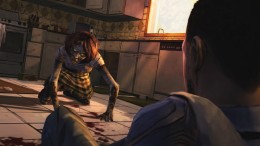 Another thing: we appreciated the pacing. A New Day moves as a pretty steady clip. You see several different areas and the action comes in dramatic bursts. The adventure game “puzzle" sections actually felt a bit sluggish compared to the rest of the episode, but the important thing is that they’re not stupidly thrown in. These sections have impact on story progression; they serve a larger purpose, in other words.
Another thing: we appreciated the pacing. A New Day moves as a pretty steady clip. You see several different areas and the action comes in dramatic bursts. The adventure game “puzzle" sections actually felt a bit sluggish compared to the rest of the episode, but the important thing is that they’re not stupidly thrown in. These sections have impact on story progression; they serve a larger purpose, in other words.
It’ll be interesting to see how our choices impact the larger story. That’s our one, true gripe of Episode 1. You see glimpses of how things pan out, but you never really get a sense of how many things are going to change. For a game that constantly reminds you that people care about what you say and has you choosing who lives and who dies, it needs to deliver. We’ll have to wait to see if it can.
Episode 2 – Starved for Help
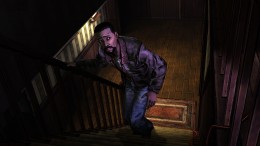 Walking Dead Episode 2 starts with a bang, an intense scene that mirrors the themes and conflicts you’ll see throughout the entire episode. It asks what’s important to Lee, and then it has him prove it in the most awful and savage way possible.
Walking Dead Episode 2 starts with a bang, an intense scene that mirrors the themes and conflicts you’ll see throughout the entire episode. It asks what’s important to Lee, and then it has him prove it in the most awful and savage way possible.
Starved for Help is all about how far Lee is willing to go, not only to protect himself, but also his group. It’s also about the people you’re with, how they want to function in and interpret their screwed reality. You’ll make hard choices with collateral emotional damage that can never be undone. If you play it out like us, you’ll shatter people.
For all the violence, bone, and viscera being thrown around in this episode, it’s weird to peg the script as the reason we kept moving along. Starved for Help is small in scope and scale and just teases actual movement to come, but it works well within its creative confines, fleshing out characters, creating tense situations, and delivering a scenario that is as bizarre and terrible as anything else in The Walking Dead proper.
And once again, we toyed with the idea of protecting Lee’s past, opting to let a person die who knew his secret. It’ll be interesting to see if this ever pans out, if, at some point, there will be no-one left who knows what Lee has done.
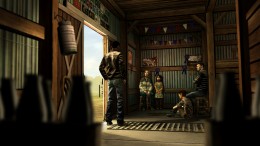 Choice is as important as ever in this episode, and you get some immediate pay-offs, but Starved for Help ultimately doesn’t prove that any choice we’ve made so far has impacted the larger story. We’re still left wondering, for example, how our actions are informing the relationship between Lee and Clementine. Or if Lee is changing as a result of some of the more… emotional decisions we’ve made so far.
Choice is as important as ever in this episode, and you get some immediate pay-offs, but Starved for Help ultimately doesn’t prove that any choice we’ve made so far has impacted the larger story. We’re still left wondering, for example, how our actions are informing the relationship between Lee and Clementine. Or if Lee is changing as a result of some of the more… emotional decisions we’ve made so far.
If there’s something we’d knock in this episode, it’d be the lack of video game-y stuff. The dialogue wheel’s options still feel as engaging as ever, but there’s a notable lack of adventure game action in this episode; the puzzle sequences are easily solvable and there’s points in this episode where you really don’t have any agency at all.
That said, Starved For Help is still incredible. The pacing is brilliant, the scenario is seriously warped and entertaining, and its attention to developing relationships will keep you making interesting decisions and thinking about the small, immediate consequences of your actions.
Episode 3 – Long Road Ahead
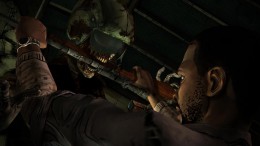 It’s weird. You’ll pop more brain caps with bolts of metal in Long Road Ahead than in any other previous episode of Walking Dead: The Game. Shooting sections are frequent and one in particular lingers, allowing Lee to rake in an obscene number of kills. But Long Road Ahead is more impactful on an emotional level than it is satisfyingly visceral. For once, you’ll be forced to explore the relationships of every party member — good, so-so, or just flat-out broken — and deal with the consequences of some of your actions.
It’s weird. You’ll pop more brain caps with bolts of metal in Long Road Ahead than in any other previous episode of Walking Dead: The Game. Shooting sections are frequent and one in particular lingers, allowing Lee to rake in an obscene number of kills. But Long Road Ahead is more impactful on an emotional level than it is satisfyingly visceral. For once, you’ll be forced to explore the relationships of every party member — good, so-so, or just flat-out broken — and deal with the consequences of some of your actions.
For instance, the fact that Lee is a murderer in the law’s eyes is confronted, whether the majority of people who knew about his past are dead or not. There’s also the shaky bond between Lilly and Lee. How she reacts to Lee and her world after the events of the last episode are fully explored in Long Road Ahead in a satisfying, intense, and wicked ways.
This episode takes place in much more realistic confines. After discovering a traitor is sneaking pills, an event forces the crew to leave the motel. A solid chunk of Long Road Ahead takes place on a working locomotive after yet another devastating event. The goal being to reach Savannah, Georgia.
It’s hard to nail a theme for Long Road Home other than “moving on," but the one thing this episode in hits, er, home, is how all decision making is now being informed by this new, terrible reality. In brilliant flashes, rash decisions are made and the consequences are immediate, and for the most part, wretched. Credit to Telltale for strengthening ties to the point where scripted behavior even has the slightest impact emotionally.
 Adventure game “action" segments come back in a big way, but unlike in the first episode of the series, they fail to serve up tension on a platter. Most of the stuff you’ll “do" are simple, almost busywork kind of puzzles that eat up time and otherwise feel flat in comparison to the actual dramatic moments.
Adventure game “action" segments come back in a big way, but unlike in the first episode of the series, they fail to serve up tension on a platter. Most of the stuff you’ll “do" are simple, almost busywork kind of puzzles that eat up time and otherwise feel flat in comparison to the actual dramatic moments.
But, oh, those moments — they’re why we play. You’ll lose people this episode. You’ll probably do a few terrible things, too. But you might also gain a new friend. You can no longer ignore Clementine, as the ties between the girl and Lee are strengthened through a couple of forced, yet touching scenes.
Long Road Ahead doesn’t answer our larger question about the long-term consequences of playing Lee as we do. Yet, it’s still an amazingly impactful episode with tons of great emotional moments that we’re afraid to even be vague about, as evens hints would spoil the fun. The conclusion in particular is one of those “Oh my god what how is this oh no" kind of things that have us absolutely stoked to see Episode 4 when it hits.
Episode 4 – Around Every Corner
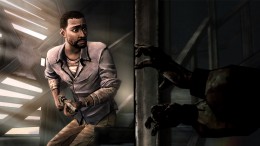 In this episode, there’s a particular moment we liked a lot. We’ll be vague, but you meet a guy who breaks Lee down. He basically told our Lee “hey, man, you’re a huge jerk." And he’s right. Our Lee is, indeed, a huge jerk — and has been since the first episode. Lee does whatever he has to in order to survive, regardless of who suffers for it. This guy who has this conversation with Lee gave me a moment to reflect on my decisions, and to think about what we’ve broken as a result. It was cool to take a moment to consider all of the crap we’ve been through with the remaining group.
In this episode, there’s a particular moment we liked a lot. We’ll be vague, but you meet a guy who breaks Lee down. He basically told our Lee “hey, man, you’re a huge jerk." And he’s right. Our Lee is, indeed, a huge jerk — and has been since the first episode. Lee does whatever he has to in order to survive, regardless of who suffers for it. This guy who has this conversation with Lee gave me a moment to reflect on my decisions, and to think about what we’ve broken as a result. It was cool to take a moment to consider all of the crap we’ve been through with the remaining group.
Around Every Corner sees Lee and company exploring Savannah Georgia moments after they hop out of the train from the last episode. The ultimate goal is to find a boat and hope that the ocean is some sort of protection from the apocalypse. Of course, things go bad. As the group walks into the historic district, church bells summon a horde and the very few survivors left in Savannah also disturb the group in profound ways.
Mechanically, this episode introduces a first-person perspective in the series’ shooting gallery sections. This is definitely a step-up, but as you might notice, you won’t need to actually guide your guns to enemies. Instead, you can just tap on their heads. On the puzzle front, you’ll do a lot of hunting for items and back-tracking.
Like, a lot of item searching, and it ends up being a huge bummer because it screws with the pacing. There’s a lot of great dialogue and situations in Around The Corner — tense and terrible and sometimes touching — but, these moments are all bookended by having to go find something that’s entirely too out of the way or too hidden. At this point, we’re all sticking around for the story, right? It sucks when overly long sections stick a pin in meaningful progression.
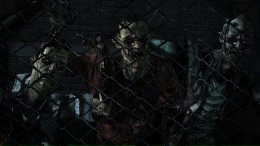 And while we’re talking about bad: there’s a few glitchy sections in Around the Corner. If you’ve played a Telltale game on your mobile before, you already know the problems: frame rate stutters, repeating audio, and funky cut-scenes. The problems hit in about the first hour and stop totally by the second of the three-to-four hour episode.
And while we’re talking about bad: there’s a few glitchy sections in Around the Corner. If you’ve played a Telltale game on your mobile before, you already know the problems: frame rate stutters, repeating audio, and funky cut-scenes. The problems hit in about the first hour and stop totally by the second of the three-to-four hour episode.
The funny about this episode is that it doesn’t have the sizzle that others have. It feels like the middle chapter of a three (instead of five) episode game, as most of what you see and do seems to be in service of setting up a pyrotechnic conclusion. That’s not to say that there isn’t good stuff in Around the Corner — the focus on Lee as a leader, Lee as protector, and Lee as a jerk (or hero) are fantastic elements fully explored in this episode — but, I never got that sense of meaningful progress that we’ve had in other games in this series.
So, yeah, this isn’t the best episode. Great overall writing, some cool moments, and the series’ signature ruthlessness keeps it interesting enough, even though it’s sloppy in a few parts. Plus, man, does it build up the fifth and final episode in the best way ever.
Episode 5 – No Time Left
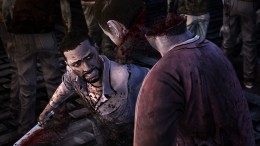 There are no choices more important than the ones you make in the fleeting moments of No Time Left. In a weird — and satisfying — turn, nothing you’ve done up until this point matters. You don’t sweat the small stuff, like that one time when you chose to give Duck rations and didn’t have anymore for Lili. You don’t even care about the meaningful life or death choices that have shaped the narrative path you’ve taken to this juncture. All your attention is funneled into a beautiful mess of choices.
There are no choices more important than the ones you make in the fleeting moments of No Time Left. In a weird — and satisfying — turn, nothing you’ve done up until this point matters. You don’t sweat the small stuff, like that one time when you chose to give Duck rations and didn’t have anymore for Lili. You don’t even care about the meaningful life or death choices that have shaped the narrative path you’ve taken to this juncture. All your attention is funneled into a beautiful mess of choices.
The marriage and flip-flopping of mechanics in this section is inspiring. The writing is superb. You’ll feel both a torturous sense of hope and helplessness as this series comes to the end, an end that skids to a halt like how the series began: with broken people in a broken world making horrible decisions.
This episode sees Lee trying to find Clementine in Savannah, moments after the previous episode concludes. Along with the remaining survivors, Lee battles his way to the girl, but finds himself compromised physically, adding to the drama of the chase.
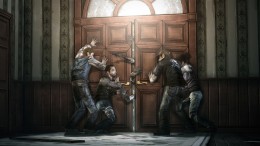 Nuts-and-bolts-wise, there’s not a lot going on in No Time Left. There isn’t an extended puzzle section, for instance, and action is kept to a minimum. You’ll mostly be climbing and exploring and making decisions. This one’s maybe 90 minutes, tops. The snappier pacing is a good thing, as it bumps up the sense of urgency that the entire episode revolves around. Very effective stuff.
Nuts-and-bolts-wise, there’s not a lot going on in No Time Left. There isn’t an extended puzzle section, for instance, and action is kept to a minimum. You’ll mostly be climbing and exploring and making decisions. This one’s maybe 90 minutes, tops. The snappier pacing is a good thing, as it bumps up the sense of urgency that the entire episode revolves around. Very effective stuff.
No Time Left is more of an emotional ride than anything else, as a grim story wraps up in a spectacular, heart wrenching way. You’ll love and hate Telltale, probably, by the end, and reflect on the many choices you’ve made when the screen fades to black.
Conclusion
Overall, The Walking Dead delivers on the comic book’s vision, but it’s also executing on things that we rarely see in video games. Its people feel like people and we’re making tough choices as we explore this world as Lee. Fantastic writing bolsters an overall package that feels like something Kirkman would pen with superb touches from an external source that understands how to deliver drama.
Mechanically, the few puzzle sections are good. At times they mess with the pacing, but as a whole they serve the story in smart ways. Same goes for the action segments, despite the flip-flopping between first and third-person combat.
Over the span of five series, we’ve spent a lot time wondering if any choice we made so far has had meaning. Basically, we were looking for a payoff that was in front of us the entire time. The payoff is the story. What you do with, and to, people in Walking Dead changes how people react to Lee. It also changes entire scenes, giving you a more personalized experience. If you save someone, they’ll tag along. If you don’t, you just won’t get the shot to understand someone better, to see them change and interact. You’ll miss out, in other words.
Sure, it’s arguable that this is a video game. Aside from short game-y sections, you’re mostly just answering questions and building relationships in a world gone bad. That’s kind of what the Walking Dead is all about though. If you’re fond of the franchise and want to play something that takes that source material seriously, and tells a great story while it does it, this game is definitely it. You seriously need to get this.
